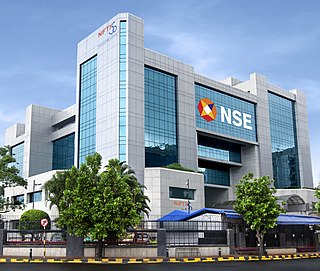
A stockbroker is an individual or company that buys and sells stocks and other investments for a financial market participant in return for a commission, markup, or fee. In most countries they are regulated as a broker or broker-dealer and may need to hold a relevant license and may be a member of a stock exchange. They generally act as a financial advisor and investment manager. In this case they may also be licensed as a financial adviser such as a registered investment adviser.

The Securities and Exchange Board of India (SEBI) is the regulatory body for securities and commodity market in India under the administrative domain of Ministry of Finance within the Government of India. It was established on 12 April 1988 as an executive body and was given statutory powers on 30 January 1992 through the SEBI Act, 1992.

National Stock Exchange of India Limited is one of the leading stock exchanges in India, based in Mumbai. NSE is under the ownership of various financial institutions such as banks and insurance companies. It is the world's largest derivatives exchange by number of contracts traded and the third largest in cash equities by number of trades for the calendar year 2022. It is one of the largest stock exchanges in the world by market capitalization. NSE's flagship index, the NIFTY 50, a 50 stock index is used extensively by investors in India and around the world as a barometer of the Indian capital market. The NIFTY 50 index was launched in 1996 by NSE.
The Chartered Financial Analyst (CFA) program is a postgraduate professional certification offered internationally by the America based CFA Institute to investment and financial professionals. The program teaches a wide range of subjects relating to advanced investment analysis—including security analysis, statistics, probability theory, fixed income, derivatives, economics, financial analysis, corporate finance, alternative investments, portfolio management—and provides a generalist knowledge of other areas of finance.
Meleveetil Damodaran is an Indian corporate advisor, mentor, and former senior government official. He is a Director on the Boards of Larsen & Toubro, Hero MotoCorp, Tech Mahindra, CRISIL, Biocon and Experian India.

A financial adviser or financial advisor is a professional who provides financial services to clients based on their financial situation. In many countries, financial advisors must complete specific training and be registered with a regulatory body in order to provide advice.

Inter-connected Stock Exchange Ltd. (ISE) is an Indian national-level stock exchange. under the ownership of Ministry of Finance, Government of India. It is responsible for providing trading, clearing, settlement, risk management and surveillance support to its trading members. It started its operation in 1998 in Vashi, Mumbai, and has 841 trading members, who are located in 18 cities. These intermediaries are administratively supported through the regional offices at Delhi, Kolkata, Patna, Ahmedabad, Coimbatore and Nagpur, besides Mumbai.

The Securities and Futures Commission (SFC) of Hong Kong is the independent statutory body charged with regulating the securities and futures markets in Hong Kong. The SFC is responsible for fostering an orderly securities and futures markets, to protect investors and to help promote Hong Kong as an international financial centre and a key financial market in China. Even though it is considered to be a branch of the government, it is run independently under the authorisation of the laws relating to Securities and Futures.
The National Institute of Bank Management is an autonomous institute located in Pune, India. It is an autonomous, apex institution for research, training, education and consultancy in bank management.

The National Securities Market Commission is the Spanish government agency responsible for the financial regulation of the securities markets in Spain. It is an independent agency that falls under the Ministry of Economy.

The Financial Services Board (FSB) was the government of South Africa's financial regulatory agency responsible for the non-banking financial services industry in South Africa from 1990 to 2018. On the 1 April 2018 its responsibilities were split into two new agencies the Financial Sector Conduct Authority (FSCA) for conduct regulation and the Prudential Authority (PA) for prudential regulation.

T. V. Mohandas Pai is a is an Indian businessman and Philanthropist. He is current Chairperson of Manipal Global Education. He was a former board member at Infosys, and Head – Administration, Education, and Research, Financial, and Human Resources at the Infosys Leadership Institute.
Sandeep Parekh, born 1971, is an Indian financial sector lawyer who founded Finsec Law Advisors, Mumbai. He attended St. Columba's School in New Delhi, India. He then attended Hindu College at Delhi University, which gave him a distinguished alumni award in 2008. 10. He then obtained a degree in law from Delhi University Law Centre II, which also recognised him as a distinguished alumni in 2007. He was profiled in 2006 by CNBC in its program 'Young Turks' by Shereen Bhan as a young leader.

India's National Voluntary Guidelines on Social, Environmental and Economic Responsibilities of Business (NVGs) were released by the Ministry of Corporate Affairs (MCA) in July 2011 by Mr. Murli Deora, the former Honourable Minister for Corporate Affairs. The national framework on Business Responsibility is essentially a set of nine principles that offer businesses an Indian understanding and approach to inculcating responsible business conduct.

Dr. Bimal N. Patel is Professor of International Law and Vice-Chancellor of the Rashtriya Raksha University, an Institute of National Importance of India, established by the Parliament of India through RRU Act No. 31, by the Ministry of Home Affairs, Government of India. The headquarters of the University is in Gandhinagar, Gujarat, India. Professor Patel has been serving as a Member of the National Security Advisory Board, an advisory board to the National Security Council headed by the Prime Minister of India. He is a member of the Financial Sector Regulatory Appointments Search Committee (FSRASC), headed by the Cabinet Secretary, established by the Appointments Committee of the Cabinet (ACC) to make recommendations of candidates for the top positions of the financial regulators of India – Reserve Bank of India, Securities and Exchange Board of India, Pension Fund Regulatory and Development Authority of India, Insurance Regulatory and Development Authority of India, Insolvency and Bankruptcy Board of India and International Financial Services Centre Authority. Patel served as the Director of the Gujarat National Law University, Gandhinagar for two consecutive terms (2008-2019). He was appointed by a high-level committee headed by the then Chief Justice of India, K G Balakrishnan, at the Supreme Court of India. He served as a member of the 21st Law Commission of India, headed by Justice Balbir Singh Chauhan, Supreme Court of India, and contributed independently or jointly 15 reports or referrals by the Supreme Court of India, including among others, criminal justice reforms, one nation-one election, sedition law, tribunalisation of justice system and prepared consolidated report on all Central Acts of India from 1834 to 2017. He is also one of the Lead Academic Advisers to India for India's tenure as a member of the UN Security Council 2021-22. He is a member of the Editorial Board of the ICRC International Review of the Red Cross, Geneva. He has served or serves various governmental and public sector organisations and academic institutions. His publications on India and International Law and Responsibility of International Organisations are reviewed and referred by international law scholars and journals. Patel is a former international civil servant, scholar, and academician of international law and diplomacy. An international law jurist, he has extensively studied, researched, commented, and published works on the administrative, procedural and substantive jurisprudence of the International Court of Justice (ICJ), International Tribunal for the Law of the Sea (ITLOS), International Criminal Tribunal for former Yugoslavia (ICTY) and International Labour Organization Administrative Tribunal (Geneva). He has published, edited several books, research papers/articles/surveys in leading academic and international law journals. He has been involved in drafting several national and state primary and secondary legislation, regulations, rules. He has delivered and served as Visiting Faculty at universities in Asia-Pacific and Europe. He has served at the Organisation for the Prohibition of Chemical Weapons, the Hague, Netherlands.
The NSE co-location scam relates to the market manipulation at the National Stock Exchange of India, India's leading stock exchange. Allegedly select players obtained market price information ahead of the rest of the market, enabling them to front run the rest of the market, possibly breaching the NSE's purpose of demutualisation exchange governance and its robust transparency-based mechanism. The alleged connivance of insiders by rigging NSE's algo-trading and use of co-located servers ensured substantial profits to a set of brokers. This widespread market fraud came to light when markets' regulator, the Securities and Exchange Board of India (SEBI), received the first anonymous complaint through a whistle-blower's letter in January 2015. The whistle-blower alleged that trading members were able to capitalise on advance knowledge by colluding with some exchange officials. The overall default amount through NSE's high-frequency trading (HFT) is estimated to be ₹500 billion over five years.
Kandathil Mathew Abraham is an Indian bureaucrat and retired IAS officer, who is currently serving as Chief Principal Secretary to the Chief Minister of Kerala. He also serves as the Chief Executive Officer of the Kerala Infrastructure Investment Fund Board (KIIFB) and Executive Vice Chairperson of Kerala Development and Innovation Strategic Council. He retired as the Chief Secretary of Kerala in December 2017. He belongs to the 1982 batch of IAS. He was instrumental in bringing out the Sahara Group Scam when he was a member of the Securities and Exchange Board of India.
Madhabi Puri Buch is the chairperson of the securities regulatory body Securities and Exchange Board of India (SEBI). She is the first woman chairperson to lead SEBI.
Financial regulation in India is governed by a number of regulatory bodies. Financial regulation is a form of regulation or supervision, which subjects financial institutions to certain requirements, restrictions and guidelines, aiming to maintain the stability and integrity of the financial system. This may be handled by either a government or non-government organization. Financial regulation has also influenced the structure of banking sectors by increasing the variety of financial products available. Financial regulation forms one of three legal categories which constitutes the content of financial law, the other two being market practices and case law.










